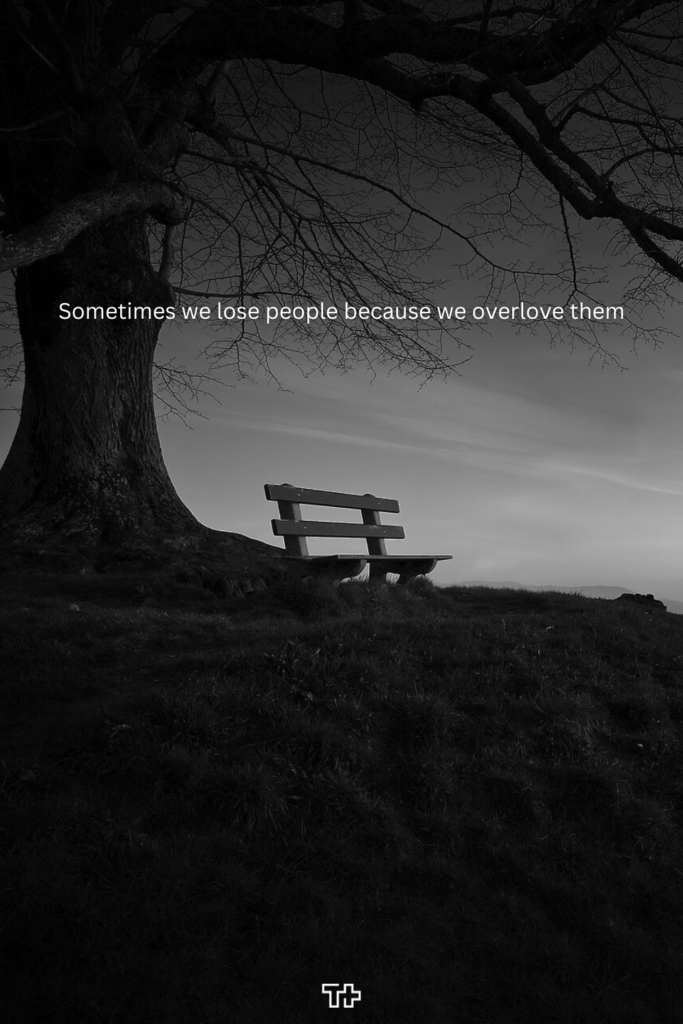Love is a powerful emotion, one that can bring us immense joy and deep fulfillment. However, love, when given in excess, can sometimes have unintended consequences. It’s a paradoxical truth: sometimes, we lose people because we overlove them. While loving deeply is often seen as a virtue, there are instances where too much love can become overwhelming, stifling, or even detrimental to the very relationship we hold dear.

The Nature of Overloving
Overloving is not about the intensity of our feelings but rather the way those feelings are expressed and managed. It occurs when love becomes all-consuming, leading to behaviors that can push the other person away. This might manifest as constant attention, excessive concern, or an overwhelming desire to control or protect the other person. While these actions may stem from a place of care and affection, they can create an environment where the person on the receiving end feels suffocated or trapped.
When we overlove, we often place the other person on a pedestal, making them the center of our world. This can lead to unrealistic expectations, dependency, and a loss of balance in the relationship. The irony is that the more we try to hold on, the more likely we are to push the person away, as they may feel overwhelmed by the pressure to meet our expectations or reciprocate our intense emotions.
The Impact of Overloving
Overloving can have several negative impacts on a relationship:
- Loss of Individuality: In an effort to nurture the relationship, one may start neglecting their own needs, interests, and boundaries. This can lead to a loss of individuality, where one person becomes overly reliant on the other for happiness and fulfillment. The person being overloved may feel the weight of this dependency, leading them to pull away in search of space and autonomy.
- Emotional Exhaustion: Love should be a source of joy and support, but when it becomes overwhelming, it can lead to emotional exhaustion for both parties. The person being overloved may feel drained by the constant attention or the expectation to be everything to their partner. On the other hand, the person doing the overlove may feel unappreciated or frustrated when their efforts are not reciprocated in the way they hoped.
- Stifling Growth: Healthy relationships allow both individuals to grow, explore, and develop independently as well as together. However, overloving can stifle this growth by creating an environment of dependency and control. The person being overloved may feel restricted, as if they can’t pursue their own interests or make decisions without considering how it will affect the other person. This lack of freedom can lead to resentment and a desire to break free.
- Erosion of Trust: Trust is a crucial component of any relationship, and overloving can erode it over time. When one person becomes overly possessive or controlling, it can signal a lack of trust in the other’s ability to make decisions or handle situations on their own. This can lead to feelings of insecurity, resentment, and ultimately, a breakdown in communication.
The Fear of Losing
At the heart of overloving often lies a deep-seated fear of losing the person we care about. This fear can drive us to hold on too tightly, to try to prevent anything that might threaten the relationship. However, this very fear can become a self-fulfilling prophecy. By trying too hard to keep someone close, we may inadvertently push them away. The pressure to constantly prove our love, to be indispensable, or to protect the relationship at all costs can make the other person feel trapped rather than cherished.
Finding Balance in Love
Loving someone deeply doesn’t have to mean losing them. The key is to find a balance between loving and letting go—between caring and giving space. Healthy love allows room for both closeness and individuality. It respects boundaries, encourages growth, and trusts in the strength of the connection without needing to control or possess.
Here are some ways to find that balance:
- Nurture Independence: Encourage both your own and your partner’s independence. Pursue your own interests, maintain friendships outside the relationship, and respect each other’s need for personal space.
- Communicate Openly: Talk about your feelings, concerns, and needs without overwhelming your partner. Honest communication helps prevent misunderstandings and allows both parties to express themselves without fear of judgment.
- Manage Expectations: Understand that no one person can meet all your needs or fulfill every expectation. Realistic expectations help maintain a healthy dynamic where both partners feel valued but not burdened.
- Trust the Process: Trust that your relationship can thrive without constant oversight. Letting go of the need to control allows love to flow naturally and fosters mutual respect and understanding.
Conclusion: Love Without Losing
It’s natural to want to protect and nurture the relationships we cherish. However, it’s important to remember that love is not about holding on too tightly, but about allowing each other the freedom to grow, explore, and thrive both individually and together. Sometimes, the best way to keep someone close is to let them breathe, to trust in the bond you share, and to love with an open hand rather than a clenched fist.
In the end, love should feel liberating, not confining. By finding the balance between loving deeply and allowing space, you can cultivate a relationship that is both strong and resilient—a relationship where both partners can flourish without fear of losing one another.
